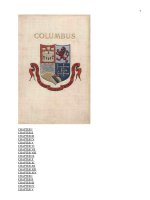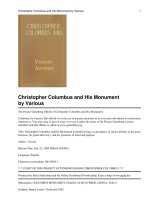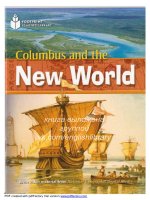12626 columbus
Bạn đang xem bản rút gọn của tài liệu. Xem và tải ngay bản đầy đủ của tài liệu tại đây (81.62 KB, 8 trang )
About Columbus Day
Columbus Day honors the day Christopher Columbus discovered America. The official
holiday falls on October 12. As with all Federal holidays, when a holiday falls on a
Sunday - it is usually observed on Monday. When it falls on a Saturday - the holiday is
usually observed on a Friday. Most schools hold programs and special events on that day.
The first Columbus Day celebration was held in New York City in 1792 - the city
celebrated the 300th anniversary of the landing. Columbus Day has been celebrated
annually since 1920.
Many Latin American countries also celebrate October 12 as the Día de la Raza (Day of
the Race). The Spanish heritage is honored of people of Latin America. Celebration
ceremonies feature speeches, parades, and colorful fiestas.
Columbus and the Egg
By James Baldwin (Adapted)
From Thirty More Famous Stories Retold
One day Columbus was at a dinner which a Spanish gentleman had given in his honor,
and several persons were present who were jealous of the great admiral's success. They
were proud, conceited fellows, and they very soon began to try to make Columbus
uncomfortable.
"You have discovered strange lands beyond the seas," they said, "but what of that? We do
not see why there should be so much said about it. Anybody can sail across the ocean and anybody can coast along the islands on the other side, just as you have done. It is the
simplest thing in the world."
Columbus made no answer - but after a while he took an egg from a dish and said to the
company:
"Who among you, gentlemen, can make this egg stand on end?"
One by one those at the table tried the experiment. When the egg had gone entirely
around and none had succeeded, all said that it could not be done.
Then Columbus took the egg and struck its small end gently upon the table so as to break
the shell a little. After that there was no trouble in making it stand upright.
"Gentlemen," said he, "what is easier than to do this which you said was impossible? It is
the simplest thing in the world. Anybody can do it - AFTER he has been shown how!''
Columbus at La Rabida
By Washington Irving (Adapted)
About half a league from the little seaport of Palos de Moguer, in Andalusia, there stood,
and continues to stand at the present day, an ancient convent of Franciscan friars,
dedicated to Santa Maria de Rabida.
One day a stranger on foot, in humble guise, but of a distinguished air, accompanied by a
small boy, stopped at the gate of the convent and asked of the porter a little bread and
water for his child. While receiving this humble refreshment, the prior of the convent,
Juan Perez de Marchena, happened to pass by, and was struck with the appearance of the
stranger. Observing from his air and accent that he was a foreigner, he entered into
conversation with him and soon learned the particulars of his story.
That stranger was Columbus.
Accompanied by his little son Diego, he was on his way to the neighboring town of
Huelva, to seek a brother-in-law, who had married a sister of his deceased wife.
The prior was a man of extensive information. His attention had been turned in some
measure to geographical and nautical science. He was greatly interested by the
conversation of Columbus, and struck with the grandeur of his views. When he found,
however, that the voyager was on the point of abandoning Spain to seek the patronage of
the court of France, the good friar took the alarm.
He detained Columbus as his guest, and sent for a scientific friend to converse with him.
That friend was Garcia Fernandez, a physician of Palos. He was equally struck with the
appearance and conversation of the stranger. Several conferences took place at the
convent, at which veteran mariners and pilots of Palos were present.
Facts were related by some of these navigators in support of the theory of Columbus. In a
word, his project was treated with a deference in the quiet cloisters of La Rabida and
among the seafaring men of Palos which had been sought in vain among sages and
philosophers.
Among the navigators of Palos was one Martin Alonzo Pinzon, the head of a family of
wealth, members of which were celebrated for their adventurous expeditions. He was so
convinced of the feasibility of Columbus's plan that he offered to engage in it with purse
and person, and to bear the expenses of Columbus in an application to court.
Fray Juan Perez, being now fully persuaded of the importance of the proposed enterprise,
advised Columbus to repair to the court, and make his propositions to the Spanish
sovereigns, offering to give him a letter of recommendation to his friend, the Prior of the
Convent of Prado and confessor to the queen, and a man of great political influence;
through whose means he would, without doubt, immediately obtain royal audience and
favor. Martin Alonzo Pinzon, also, generously furnished him with money for the journey,
and the Friar took charge of his youthful son, Diego, to maintain and educate him in the
convent.
Thus aided and encouraged and elated with fresh hopes, Columbus took leave of the little
junto at La Rabida, and set out, in the spring of 1486, for the Castilian court, which had
just assembled at Cordova, where the sovereigns were fully occupied with their
chivalrous enterprise for the conquest of Granada. But alas! Success was not yet - for
Columbus met with continued disappointments and discouragements, while his projects
were opposed by many eminent prelates and Spanish scientists, as being against religion
and unscientific. Yet in spite of this opposition, by degrees the theory of Columbus began
to obtain proselytes. He appeared in the presence of the king with modesty, yet selfpossession, inspired by a consciousness of the dignity and importance of his errand; for
he felt himself, as he afterwards declared in his letters, animated as if by a sacred fire
from above, and considered himself an instrument in the hand of Heaven to accomplish
its great designs. For nearly seven years of apparently fruitless solicitation, Columbus
followed the royal court from place to place, at times encouraged by the sovereigns, and
at others neglected.
At last he looked round in search of some other source of patronage, and feeling averse to
subjecting himself to further tantalizing delays and disappointments of the court,
determined to repair to Paris. He departed, therefore, and went to the Convent of La
Rabida to seek his son Diego. When the worthy Friar Juan Perez de Marchena beheld
Columbus arrive once more at the gate of his convent after nearly seven years of fruitless
effort at court, and saw by the humility of his garb the poverty he had experienced, he
was greatly moved, but when he found that he was about to carry his proposition to
another country, his patriotism took alarm.
The Friar had once been confessor to the queen, and knew that she was always accessible
to persons of his sacred calling. He therefore wrote a letter to her, and at the same time
entreated Columbus to remain at the convent until an answer could be received. The latter
was easily persuaded, for he felt as if on leaving Spain he was again abandoning his
home.
The little council at La Rabida now cast round their eyes for an ambassador to send on
this momentous mission. They chose one Sebastian Rodriguez, a pilot of Lepe, one of the
most shrewd and important personages in this maritime neighborhood. He so faithfully
and successfully conducted his embassy that he returned shortly with an answer.
Isabella had always been favorably disposed to the proposition of Columbus. She thanked
Juan Perez for his timely services and requested him to repair immediately to the court,
leaving Columbus in confident hope until he should hear further from her. This royal
letter, brought back by the pilot at the end of fourteen days, spread great joy in the little
junto at the convent.
No sooner did the warm-hearted friar receive it than he saddled his mule, and departed,
privately, before midnight to the court. He journeyed through the countries of the Moors,
and rode into the new city of Santa Fe where Ferdinand and Isabella were engaged in
besieging the capital of Granada.
The sacred office of Juan Perez gained him a ready admission into the presence of the
queen. He pleaded the cause of Columbus with enthusiasm. He told of his honorable
motives, of his knowledge and experience, and his perfect capacity to fulfill the
undertaking. He showed the solid principles upon which the enterprise was founded, and
the advantage that must attend its success, and the glory it must shed upon the Spanish
Crown.
Isabella, being warm and generous of nature and sanguine of disposition, was moved by
the representations of Juan Perez, and requested that Columbus might be again sent to
her. Bethinking herself of his poverty and his humble plight, she ordered that money
should be forwarded to him, sufficient to bear his traveling expenses, and to furnish him
with decent raiment.
The worthy friar lost no time in communicating the result of his mission. He transmitted
the money, and a letter, by the hand of an inhabitant of Palos, to the physician, Garcia
Fernandez, who delivered them to Columbus The latter immediately changed his
threadbare garb for one more suited to the sphere of a court, and purchasing a mule, set
out again, reanimated by hopes, for the camp before Granada.
This time, after some delay, his mission was attended with success. The generous spirit of
Isabella was enkindled, and it seemed as if the subject, for the first time, broke upon her
mind in all its real grandeur. She declared her resolution to undertake the enterprise, but
paused for a moment, remembering that King Ferdinand looked coldly on the affair, and
that the royal treasury was absolutely drained by the war.
Her suspense was but momentary. With an enthusiasm worthy of herself and of the cause,
she exclaimed: "I undertake the enterprise for my own crown of Castile, and will pledge
my jewels to raise the necessary funds." This was the proudest moment in the life of
Isabella. It stamped her renown forever as the patroness of the discovery of the New
World.
The Mutiny
By A. De Lamartine (Adapted)
When Columbus left the Canaries to pass with his three small ships into the unknown
seas, the eruptions of Teneriffe illuminated the heavens and were reflected in the sea.
This cast terror into the minds of his seamen. They thought that it was the flaming sword
of the angel who expelled the first man from Eden, and who now was trying to drive back
in anger those presumptuous ones who were seeking entrance to the forbidden and
unknown seas and lands. But the admiral passed from ship to ship explaining to his men,
in a simple way, the action of volcanoes, so that the sailors were no longer afraid.
But as the peak of Teneriffe sank below the horizon, a great sadness fell upon the men. It
was their last beacon, the farthest sea-mark of the Old World. They were seized with a
nameless terror and loneliness.
Then the admiral called them around him in his own ship, and told them many stories of
the things they might hope to find in the wonderful new world to which they were going of the lands, the islands, the seas, the kingdoms, the riches, the vegetation, the sunshine,
the mines of gold, the sands covered with pearls, the mountains shining with precious
stones, the plains loaded with spices. These stories, tinged with the brilliant colors of
their leader's rich imagination, filled the discouraged sailors with hope and good spirits.
But as they passed over the trackless ocean, and saw day by day the great billows rolling
between them and the mysterious horizon, the sailors were again filled with dread. They
lacked the courage to sail onward into the unknown distance. The compass began to
vacillate, and no longer pointed toward the north. This confused both Columbus and his
pilots. The men fell into a panic, but the resolute and patient admiral encouraged them
once more. So buoyed up by his faith and hope, they continued to sail onwards over the
pathless waters.
The next day a heron and a tropical bird flew about the masts of the ships, and these
seemed to the wondering sailors as two witnesses come to confirm the reasoning of
Columbus.
The weather was mild and serene, the sky clear, the waves transparent, the dolphins
played across the bows, the airs were warm, and the perfumes, which the waves brought
from afar, seemed to exhale from their foam. The brilliancy of the stars and the deep
beauty of the night breathed a feeling of calm security that comforted and sustained the
sailors.
The sea also began to bring its messages. Unknown vegetations floated upon its surface.
Some were rock-plants that had been swept off the cliffs by the waves. Some were freshwater plants, and others - recently torn from their roots, were still full of sap. One of them
carried a live crab - a little sailor afloat on a tuft of grass. These plants and living things
could not have passed many days in the water without fading and dying. And all
encouraged the sailors to believe that they were nearing land.
At eve and morning the distant waning clouds, like those that gather round the mountaintops, took the form of cliffs and hills skirting the horizon. The cry of "land" was on the
tip of every tongue. But Columbus by his reckoning knew that they must still be far from
any land, but fearing to discourage his men he kept his thoughts to himself, for he found
no trustworthy friend among his companions whose heart was firm enough to bear his
secret.
During the long passage Columbus conversed with his own thoughts, and with the stars,
and with God whom he felt was his protector. He occupied his days in making notes of
what he observed. The nights he passed on deck with his pilots, studying the stars and
watching the seas. He withdrew into himself, and his thoughtful gravity impressed his
companions sometimes with respect and sometimes with mistrust and awe.
Each morning the bows of the vessels plunged through the fantastic horizon which the
evening mist had made the sailors mistake for a shore. They kept rolling on through the
boundless and bottomless abyss. Gradually terror and discontent once more took
possession of the crews. They began to imagine that the steadfast east wind that drove
them westward prevailed eternally in this region and that when the time came to sail
homeward, the same wind would prevent their return. For surely their provisions and
water could not hold out long enough for them to beat their way eastward over those wide
waters!
Then the sailors began to murmur against the admiral and his seeming fruitless obstinacy,
and they blamed themselves for obeying him, when it might mean the sacrifice of the
lives of one hundred and twenty sailors.
But each time the murmurs threatened to break out into mutiny, Providence seemed to
send more encouraging signs of land. And these for the time being changed the
complaints to hopes. At evening little birds of the most delicate species, that build their
nests in the shrubs of the garden and orchard, hovered warbling about the masts. Their
delicate wings and joyous notes bore no signs of weariness or fright, as of birds swept far
away to sea by a storm. These signs again aroused hope.
The green weeds on the surface of the ocean looked like waving corn before the ears are
ripe. The vegetation beneath the water delighted the eyes of the sailors tired of the
endless expanse of blue. But the seaweed soon became so thick that they were afraid of
entangling their rudders and keels, and of remaining prisoners forever in the forests of the
ocean, as ships of the northern seas are shut in by ice. Thus each joy soon turned to fear so terrible to man is the unknown.
The wind ceased, the calms of the tropics alarmed the sailors. An immense whale was
seen sleeping on the waters. They fancied there were monsters in the deep which would
devour their ships. The roll of the waves drove them upon currents which they could not
stem for want of wind. They imagined they were approaching the cataracts of the ocean,
and that they were being hurried toward the abysses into which the deluge had poured its
world of waters.
Fierce and angry faces crowded round the mast. The murmurs rose louder and louder.
They talked of compelling the pilots to put about and of throwing the admiral into the
sea. Columbus, to whom their looks and threats revealed these plans, defied them by his
bold bearing or disconcerted them by his coolness.
Again nature came to his assistance, by giving him fresh breezes from the east, and a
calm sea under his bows. Before the close of the day came the first cry of "Land ho!"
from the lofty poop. All the crews, repeating this cry of safety, life, and triumph, fell on
their knees on the decks, and struck up the hymn, "Glory be to God in heaven and upon
earth." When it was over, all climbed as high as they could up the masts, yards, and
rigging to see with their own eyes the new land that had been sighted.
But the sunrise destroyed this new hope all too quickly. The imaginary land disappeared
with the morning mist, and once more the ships seemed to be sailing over a never-ending
wilderness of waters.
Despair took possession of the crews. Again the cry of "Land ho!" was heard. But the
sailors found as before that their hopes were but a passing cloud. Nothing wearies the
heart so much as false hopes and bitter disappointments.
Loud reproaches against the admiral were heard from every quarter. Bread and water
were beginning to fail. Despair changed to fury. The men decided to turn the heads of the
vessels toward Europe, and to beat back against the winds that had favored the admiral,
whom they intended to chain to the mast of his own vessel and to give up to the
vengeance of Spain should they ever reach the port of their own country.
These complaints now became clamorous. The admiral restrained them by the calmness
of his countenance. He called upon Heaven to decide between himself and the sailors. He
flinched not. He offered his life as a pledge, if they would but trust and wait for three
days more. He swore that, if, in the course of the third day, land was not visible on the
horizon, he would yield to their wishes and steer for Europe.
The mutinous men reluctantly consented and allowed him three days of grace. . .
At sunrise on the second day rushes recently torn up were seen floating near the vessels.
A plank hewn by an axe, a carved stick, a bough of hawthorn in blossom, and lastly a
bird's nest built on a branch which the wind had broken, and full of eggs on which the
parent-bird was sitting, were seen swimming past on the waters. The sailors brought on
board these living witnesses of their approach to land. They were like a message from the
shore, confirming the promises of Columbus.
The overjoyed and repentant mutineers fell on their knees before the admiral whom they
had insulted but the day before, and craved pardon for their mistrust.
As the day and night advanced many other sights and sounds showed that land was very
near. Toward day delicious and unknown perfumes borne on a soft land breeze reached
the vessels, and there was heard the roar of the waves upon the reefs.
The dawn, as it spread over the sky, gradually raised the shores of an island from the
waves. Its distant extremities were lost in the morning mist. As the sun rose it shone on
the land ascending from a low yellow beach to the summit of hills whose dark - green
covering contrasted strongly with the clear blue of the heavens. The foam of the waves
broke on the yellow sand, and forests of tall and unknown trees stretched away, one
above another, over successive terraces of the island. Green valleys, and bright clefts in
the hollows afforded a half glimpse into these mysterious wilds. And thus the land of
golden promises, the land of future greatness, first appeared to Christopher Columbus,
the Admiral of the Ocean, and thus he gave a New World to the nations to come.
The First Landing of Columbus in the
New World
By Washington Irving (Adapted)
It was on Friday morning, the 12th of October, that Columbus first beheld the New
World. As the day dawned he saw before him an island, several leagues in extent, and
covered with trees like a continual orchard. Though apparently uncultivated it was
populous, for the inhabitants were seen issuing from all parts of the woods and running to
the shore. They were perfectly naked, and, as they stood gazing at the ships, appeared by
their attitudes and gestures to be lost in astonishment.
Columbus made signals for the ships to cast anchor and the boats to be manned and
armed. He entered his own boat, richly attired in scarlet, and holding the royal standard;
while Martin Alonzo Pinzon and his brother put off in company in their boats, each with
a banner of the enterprise emblazoned with a green cross, having on either side the letters
"F."' and "Y.," the initials of the Castilian monarchs Fernando and Ysabel, surmounted by
crowns.
As he approached the shore, Columbus was delighted with the purity and suavity of the
atmosphere, the crystal transparency of the sea, and the extraordinary beauty of the
vegetation. He beheld also fruits of an unknown kind upon the trees which overhung the
shores.
On landing he threw himself on his knees, kissed the earth, and returned thanks to God
with tears of joy. His example was followed by the rest. "Almighty and Eternal God,"
prayed Columbus, "who by the energy of Thy creative word hast made the firmament, the
earth and the sea - blessed and glorified be thy name in all places! May thy majesty and
dominion be exalted for ever and ever, as Thou hast permitted thy holy name to be made
known and spread by the most humble of thy servants, in this hitherto unknown portion
of Thine empire."
Columbus, then rising, drew his sword, displayed the royal standard, and assembling
around him the two captains and the rest who had landed, he took solemn possession in
the name of the Castilian sovereigns, giving the island the name of San Salvador.









